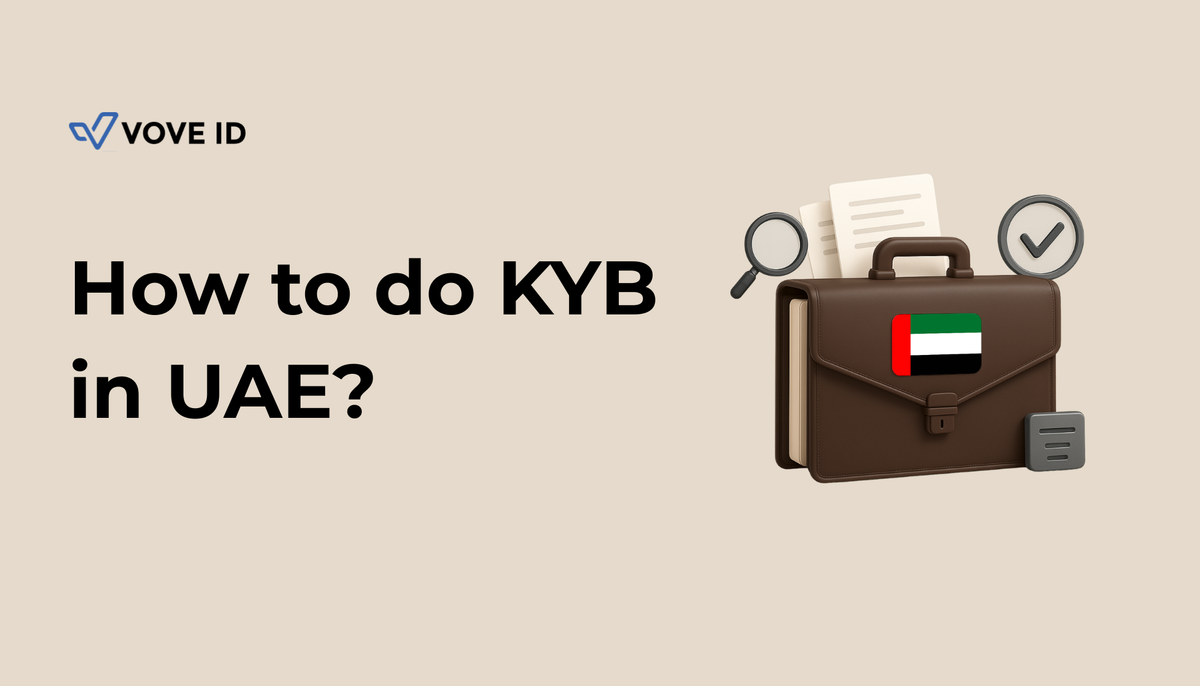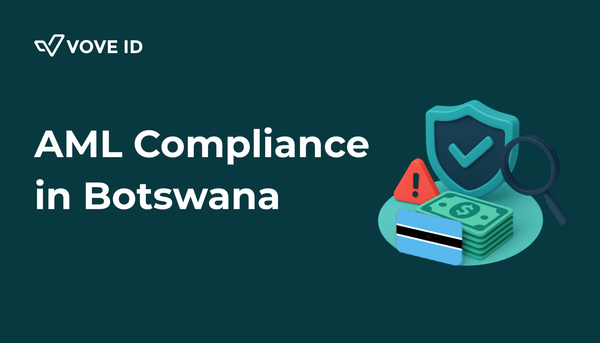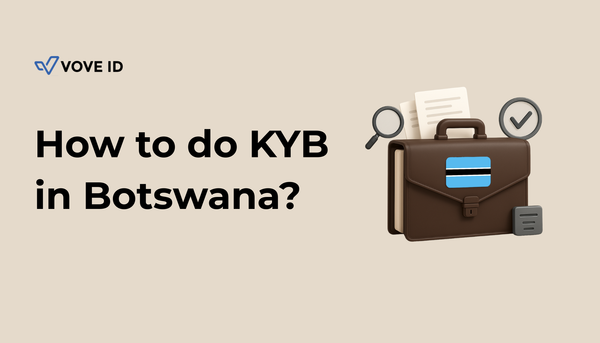KYB Compliance in UAE: 2025 Guide for Regulated Businesses
Master KYB compliance in the UAE for 2025 with expert insights on Federal Decree-Law No. 20, CBUAE rules, and actionable strategies to protect your business from financial crime.

Why KYB Matters in the UAE Right Now
The UAE is gearing up for a pivotal moment—the 2026 FATF mutual evaluation—following its exit from the grey list in 2024, a milestone celebrated in the FATF’s 2024 Follow-Up Report. This reflects the nation’s ongoing commitment to bolstering its anti-money laundering (AML) and counter-terrorism financing (CTF) frameworks, but the journey isn’t over yet.
To combat financial crime, especially in high-risk areas like real estate and virtual assets, regulators such as the Central Bank of the UAE (CBUAE), Dubai Financial Services Authority (DFSA), and Abu Dhabi Global Market Financial Services Regulatory Authority (ADGM FSRA) are placing renewed emphasis on Know Your Business (KYB)—a vital process for verifying the identity and ownership of corporate clients. Backed by Federal Decree-Law No. 20 of 2018 on Anti-Money Laundering and Cabinet Decision No. 10 of 2019, KYB helps ensure businesses operate transparently. Non-compliance can bring steep penalties—fines up to AED 50 million or even license revocation—as the UAE aligns with international standards. Let’s explore what KYB compliance means for UAE businesses in 2025.
A CBUAE spokesperson underscored KYB’s importance in 2024: “The CBUAE remains committed to strengthening KYB frameworks to protect the UAE’s financial ecosystem.”
What Exactly is KYB?
At its core, KYB is about safeguarding the UAE’s financial system by verifying the identity and ownership of business clients to thwart money laundering and terrorist financing. This involves confirming a company’s registration, pinpointing its ultimate beneficial owners (UBOs), and evaluating risks. Overseen by the CBUAE, DFSA, and FSRA across the mainland and free zones like DIFC and ADGM, KYB is essential given the UAE’s status as a global trade hub—a magnet for illicit activities. The FATF’s 2024 review lauded progress but highlighted weaknesses in non-financial sectors, pushing for stronger KYB measures.
With that foundation, let’s turn to who needs to step up.
Who Needs to Follow KYB Rules?
KYB applies to regulated entities under Federal Decree-Law No. 20 of 2018, including:
- Banks, finance companies, and exchange houses
- Investment firms and insurance providers
- Virtual Asset Service Providers (VASPs), overseen by VARA and SCA
- Real estate agents and legal professionals
- Designated Non-Financial Businesses and Professions (DNFBPs), such as precious metal dealers
The CBUAE manages mainland operations, while the DFSA and FSRA govern DIFC and ADGM firms, respectively, each guided by their AML rulebooks (DFSA AML Rulebook, ADGM FSRA Rulebook). Free zones like DIFC and ADGM are key players in KYB due to their draw for international businesses, necessitating rigorous oversight to curb financial crime.
Non-regulated entities, like e-commerce platforms, might adopt KYB voluntarily to reduce risks, while B2B companies are strongly encouraged to comply for partner transparency.
Now that we know who’s involved, let’s dive into the key requirements.
Core KYB Requirements in UAE for 2025
Here’s what regulators expect to ensure robust verification of ultimate beneficial owners (UBOs):
- Verify Business Identity: Confirm legitimacy with a trade license, certificate of incorporation, or Emirates ID registration.
- Identify Beneficial Owners: Spot UBOs—individuals owning or controlling at least 25% of a company—as per AML/CTF guidelines, a threshold that may evolve. This 25% rule helps regulators uncover those using businesses to mask illicit funds, with UBO data held in the CBUAE registry, accessible only to regulators for privacy—unlike the UK’s public PSC register. Outside DIFC, data remains private, contrasting with DIFC’s public registry, while ADGM’s access is more limited, though both align with federal law.
- Screen for Risks: Check against sanctions lists, politically exposed persons (PEPs), and adverse media.
- Assess Risks: Review the business’s sector, location, and transactions, using Enhanced Due Diligence (EDD) for high-risk cases, like those with offshore structures or ties to risky jurisdictions, per FSRA guidelines.
- Monitor Transactions: Watch for suspicious patterns and update profiles as needed.
- Retain Records: Keep KYB records for five years, available to the Financial Intelligence Unit (FIU) within 30 days.
Regulated entities must retain KYB records—licenses and UBO details—for five years and file suspicious activity reports with the FIU promptly.
Tools like VOVE ID’s API-based verification can simplify this process, boosting accuracy and efficiency.
With the basics covered, let’s tackle the real-world challenges—and how to address them.
Implementation Challenges & Solutions
KYB compliance can be tricky. Here are some hurdles and ways to navigate them:
- Complex Ownership Structures: Multi-layered setups, especially in free zones, complicate UBO identification. In the UAE, this is heightened by offshore structures in DIFC and ADGM, often used for tax benefits, which can obscure true ownership.
- Regulatory Variations: Differences between CBUAE, DFSA, and FSRA rules can create gaps.
- Data Privacy: Juggling KYB with UAE data protection laws adds complexity.
- Resource Limitations: Smaller firms may find manual processes daunting due to limited staff or budget.
The UAE’s 25% UBO threshold aligns with FATF standards, but unlike the UK’s public PSC registers, UBO data here stays private.
Overcome these with automation, staff training, or expert partnerships.
Let’s look at some practical steps to strengthen your KYB approach in 2025.
Best Practices for KYB Compliance
Stay ahead with these actionable tips:
- Leverage Automation: Use digital tools for real-time business and UBO verification.
- Centralize Data: Rely on UAE registries and free zone databases for reliable info.
- Conduct Risk Assessments: Follow the CBUAE’s risk-based approach to spot issues early.
- Train Your Team: Keep staff updated on AML/CTF risks and rule changes.
- Partner with Experts: Collaborate with KYB specialists familiar with UAE laws.
- Monitor Changes: Keep an eye on federal and free zone updates.
What documents are needed?
Trade license, incorporation certificate, and UBO details.
Are exemptions available?
Yes, for low-risk entities like listed companies, bound by existing disclosure rules.
What if UBO data is missing?
Document due diligence and notify the FIU.
The Risk of Incomplete UBO Information
Gaps in UBO data can trigger penalties or onboarding delays. Thorough checks and prompt FIU reporting are essential.
How UAE Compares in the Region
Comparison Table: KYB Across GCC States (Alt Text: Table comparing KYB requirements in UAE, Saudi Arabia, and Qatar for screen readers)
Make this dynamic on your website, letting users toggle data like fines or retention periods for real-time comparisons.
| Country | Beneficial Ownership Threshold | Record Retention | Enforcement Stats (2025) |
|---|---|---|---|
| UAE | 25% (Federal Law No. 20) | 5 years | AED 23.5M in fines (based on CBUAE Enforcement Report 2025) |
| Saudi Arabia | 25% (SAMA rules) | 10 years | SAR 15M in fines (SAMA Annual Report 2024) |
| Qatar | 25% (QCB guidelines) | 5 years | QAR 10M in fines (QCB Enforcement Summary 2024) |
This shows the UAE’s alignment with regional norms, though enforcement varies.
Recent Updates (2025)
- Enhanced oversight of DNFBPs and VASPs to tackle FATF-identified gaps.
- Launch of the goAML system for efficient suspicious activity reporting.
- DFSA’s 2025 policy update on virtual assets, mandating stricter KYB for crypto firms.
Trends
KYB in the UAE is evolving with technology, as AI improves UBO detection and automation gains traction. Digital KYB adoption is projected to grow 30% by 2026, driven by tighter rules and fintech growth, per industry insights. Explore the UAE’s AML/CTF journey via the CBUAE timeline.
Emerging Risks to Watch in 2025
- AI-generated identity documents mimicking UBOs: Deploy AI tools to detect fraud and verify against official records.
- Free zone arbitrage exploiting lighter oversight: Conduct deep due diligence, track regulatory shifts, and use AI to spot odd patterns.
- Cross-border ownership from high-risk areas: Enhance screening, check sanctions lists, and leverage AI for ownership insights.
- Crypto-to-fiat layering in DIFC/ADGM: Use transaction monitoring and AI to flag suspicious crypto flows.
Wrapping Up
KYB ensures compliance with Federal Decree-Law No. 20 of 2018 and AML/CTF rules, shielding businesses from financial crime. A Dubai real estate firm sidestepped penalties in 2024 by using VOVE ID’s automated UBO checks before a CBUAE audit. Ready to simplify your process? Book a VOVE ID demo to see automation in action. Need guidance through the UAE’s regulatory maze? Schedule a free consultation or discover how VOVE ID can streamline your onboarding. With the 2026 FATF review looming, now’s the moment to get ahead.
Fo
Metadata
Title: KYB Compliance in UAE: 2025 Guide for Regulated Businesses
Description: Explore KYB compliance in the UAE for 2025, covering Federal Decree-Law No. 20, CBUAE, and business verification strategies.
Keywords: KYB in UAE, AML compliance UAE, Know Your Business UAE, CBUAE regulations, business verification UAE, digital KYB solutions, corporate onboarding UAE, beneficial ownership verification UAE, AML compliance for free zone businesses, KYB compliance for UAE businesses in 2025, UAE ultimate beneficial owner verification requirements, digital KYB solutions for UAE financial institutions




